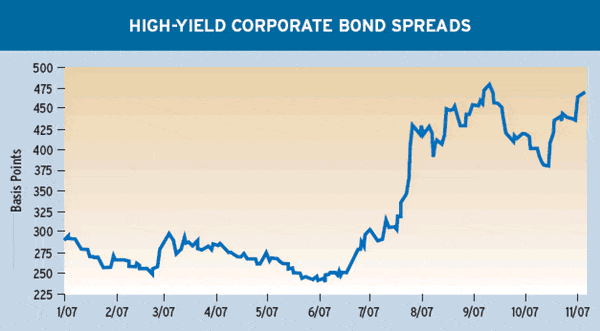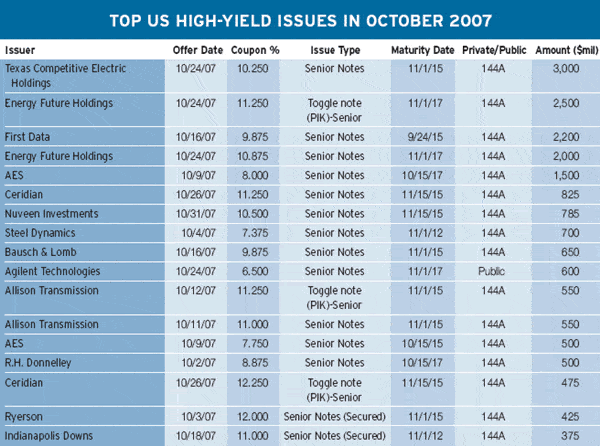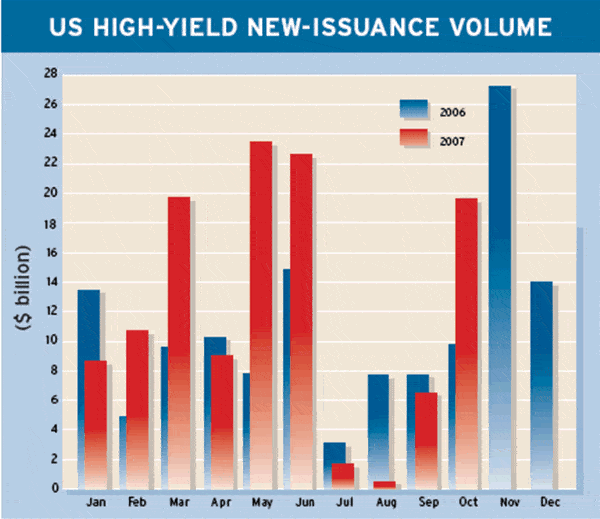CORPORATE FINANCING FOCUS
“October has been a strong month, and there has been good, healthy demand for new issues,” says Kingman Penniman, president and chief executive of KDP, which provides data and research on the high-yield market. “The banks are starting to whittle down the backlog of loans and debt to finance leveraged buyouts,” he adds.
By obtaining financing in the markets or withdrawing takeover deals, the banks have cut the total backlog of high-yield debt and leveraged loans from a peak in July of around $340 billion to about $240 billion as of early November, according to Penniman. “Recent new issues of high-yield bonds have been sufficiently well received and adequately priced that the market has been able to absorb them,” he explains. “We are still seeing a pretty healthy calendar of new issues planning to come to market,” he notes.
Credit Crunch Is Not Over
This doesn’t mean that the credit crunch is over, Penniman says. “The general concern about a lack of transparency in valuing securities is creating volatility,” he says. “Meanwhile, we don’t know if SIVs [structured investment vehicles] and commercial paper conduits have been adequately charged off,” he adds.
High-yield corporate bond spreads over US treasury securities widened last month to equal their biggest levels of the year recorded in August at the depths of the crisis. “The market got a bit ahead of itself in repricing risk,” Penniman says. “There is a realization now that issues have to be priced to sell.”
Leveraged loans will probably be the first segment of the credit markets to return to more normal conditions, Penniman says. “The credit metrics for companies are good, and there is still a very low level of defaults,” he notes.
Appetite for risk in the credit markets has declined dramatically, with a resultant downward repricing, says Joyce DeLucca, managing principal at Kingsland Capital Management, a New York-based firm that manages and markets collateralized debt obligations and other structured finance vehicles. “There is a large pipeline of LBO financings still due to make their way through the gantlet,” she says. “Just how things look when that pipeline is complete is the question.”
New Underwriting Standards
Whether or not the market absorbs the entire pipeline and how those deals trade after the books close will help determine underwriting standards in the coming quarters, DeLucca says. “We think it could take a year or more to work through the dislocation,” she says. “The market has several multi-billion-dollar deals to work through, and even if agent banks are willing to hold some of that exposure on their books to wait for a better day, I wonder about what happens next,” she says.
DeLucca says the markets are currently putting on a brave face, which often occurs as cycles turn. “Underwriting banks have stated a willingness to hold certain risks on their balance sheets for some period of time, and so the deals are getting done,” she says. “You can be sure that those same banks don’t have plans to hold large exposures to the new financings they will underwrite once the current pipeline is complete,” she adds.
US consumer spending is likely to weaken as a result of the housing slump, which will have a negative impact on the economy, DeLucca says. “Coupled with tight lending markets, we don’t see how the corporate markets can avoid weaker operational results and increasing default levels as companies pay the higher costs of financing, and some cannot get financing at all,” she says.
Chrysler Tries Again
As Global Finance went to press, investment banks were attempting to sell up to $7.5 billion in loans for Chrysler’s automotive business. The first-lien term loans, which were reduced from an originally planned $8 billion, were expected to carry a price of 400 basis points over the London interbank offered rate, or Libor, with a likely original issue discount. A similar sale was postponed in July amid credit market turmoil. The loans would help finance the leveraged buyout of Chrysler’s automotive business from Daimler in August by private equity firm Cerberus Capital Management.
 |
|
|
 |
|
Kingman Penniman, president and CEO, KDP Investment Advisors |
Meanwhile, banks led by Goldman Sachs began to sell $6 billion of loans that will be used to fund Arkansas-based Alltel’s $24.7 billion private equity-backed leveraged buyout by TPG, formerly known as Texas Pacific Group, and the private equity arm of Goldman Sachs. The loans were priced at 275 basis points over Libor and were being offered at a discount of 97.5 cents on the dollar. Alltel’s banks underwrote $14 billion of loans and a $1.5 billion revolving credit line to help finance the buyout, which was announced in May.
The next chapter in the subprime mortgage saga almost surely will cover subprime’s impact on the capital of money center banks, broker/dealers, monoline bond insurers and others still strapped with risk, says Steven Abrahams, senior managing director and head of global liquid product strategy fixed-income research at Bear Stearns. “Losses have eaten into some capital already, and illiquid positions in remaining risk could keep capital tied up well into 2008,” he says. “Unfortunately, the debate over the right value for mortgage debt probably will continue well into next year.”
The lingering uncertainty likely means that most participants in the market will try to conserve capital, lower risk or do both, Abrahams says. “That probably means less room for holding positions in some securities, more hedging, less willingness to finance purchases,” he says.
In September and October, banks sold more than $70 billion in pass-throughs to raise cash in lieu of selling positions in distressed credits, according to Abrahams. If there is any good news, it may be that the picture of risk and value should be clear by the end of 2008 at the latest, he says. “By that point, most of the weakest subprime loans will have reset, the impact of loss-mitigation efforts should be obvious, the results of foreclosure easier to predict,” he says.
A potential worry for the long end of the yield curve is that the declining dollar continues to eat into the returns of foreign investors, Abrahams says. This could diminish foreign demand for US debt and push up longer yields, he says.
LBO Financings Go Ahead
 |
|
|
 |
|
|
Texas Competitive Electric Holdings sold $3 billion of senior notes priced at par to yield 10.25%. Goldman Sachs, Morgan Stanley, Citi, JPMorgan, Lehman Brothers and Credit Suisse were the joint lead underwriters.
Energy Future Holdings sold $2.5 billion of 11.25% 10-year senior toggle notes priced to yield 11.625%. It also sold $2 billion 10.875% 10-year senior notes, which were priced at par.
In another closely watched deal, Colorado-based credit-card processor First Data sold $2.2 billion in eight-year notes in the private-placement market. The size of the deal was reduced from an originally planned $3.75 billion. The notes carried a 9.875% coupon and were priced at a discount to yield 10.875%. Citi, Credit Suisse, Deutsche Bank, HSBC, Lehman Brothers, Goldman Sachs and Merrill Lynch were the joint lead managers for the sale. First Data will use the proceeds to back its leveraged buyout in April by Kohlberg Kravis Roberts. First Data, which provides electronic commerce and payments services, was split off from American Express in 1992.
Independent power producer AES sold $2 billion in a two-part senior note sale in the 144A private market. AES sold $1.5 billion of 10-year senior notes priced to yield 334 basis points more than treasury securities. It also sold $500 million of eight-year senior notes, priced to yield 318 basis points above treasuries.
Gordon Platt



